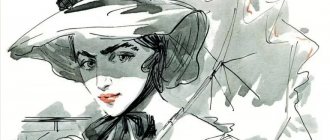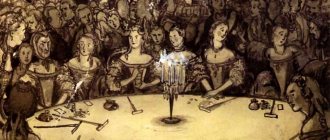About the product
The story “Spring Waters” by Turgenev was written in 1872. The work belongs to the late period of the writer’s work and tells the story of the love story of a rich Russian landowner who fruitlessly squandered his best years.
To better prepare for a literature lesson, we recommend reading online a summary of the story “Spring Waters” chapter by chapter. A retelling of the work will also be useful for the reader's diary.
The material was prepared jointly with the highest category teacher Lyubov Alexandrovna Koroshchup.
Experience as a teacher of Russian language and literature - 30 years.
About the book
“Spring Waters” is a story written in 1872. This period of Turgenev's work is characterized by writing works based on memories of the past. For example, “Unfortunate”, “Knocks”, “Strange Story”, etc. Of all these stories, the work “Spring Waters” is considered the most successful. And the main character became a wonderful addition to Turgenev’s gallery of weak-willed characters.
The story was published in 1873.
Other characters
- Lenore Roselli is Gemma's mother, a widow, a kind, pragmatic woman.
- Emilio Roselli is Gemma's brother, an ardent and noble teenager.
- Pantaleone is an old and faithful servant of the Roselli family.
- Karl Klüber is a young wealthy German, Gemma's fiancé.
- Dongof is a baron with whom Sanin became friends after the duel.
- Ippolit Polozov is Sanin’s childhood friend, the weak-willed husband of Marya Nikolaevna.
Summary
Landowner Dmitry Pavlovich Sanin “recently passed his 52nd year.” While going through old letters in the table, he accidentally came across a case in which a “small garnet cross” was kept. Seeing him, the man cried out weakly and plunged into memories...
Chapters 1–3
In 1840, “Sanin turned 22.” Returning home from Italy, he decided to spend one day in Frankfurt. After wandering around the city, the young man went into an Italian pastry shop.
Suddenly, a beautiful dark-haired girl ran into the room and began to ask for help. Sanin followed the stranger and in the next room found a pale teenage boy who was in a deep faint.
Sanin ordered brushes to be brought and “began scrubbing his chest and arms with all his might.” Against his will, he glanced sideways at the girl: “Oh my God! what a beauty she was!”
Sanin managed to bring the boy to his senses. Soon his mother appeared in the pastry shop, accompanied by a doctor. Deciding “that he was becoming superfluous,” the young man wanted to go outside, but the girl asked him to come to them “in an hour for a cup of chocolate.”
Chapters 4–7
Sanin reappeared in the confectionery shop, whose owners accepted him as if they were their own. He met the Roselli family: the widow Lenore, her eldest daughter Gemma and son Emilio, as well as the old faithful servant Pantaleone.
Madame Lenore had a vague idea of Russia. She believed that there was “eternal snow, everyone wears fur coats, and everyone is military.” Sanin began to talk fascinatingly about his homeland. He even performed several old romances and folk songs, which won over his new acquaintances.
Sanin was so carried away by the conversation that he was late for the evening stagecoach. The Rosellis invited their Russian guest to visit them the next day so that he could meet Gemma's fiancé.
Chapters 8–13
The beauty's groom turned out to be a “prominent and tall young man with a handsome face” named Karl Klüber.
In a private conversation, Emilio admitted to his new friend that his mother, under the influence of Kluber, wanted to make him a merchant, while the boy himself dreamed of fame as an artist. Sanin decided to talk to Mrs. Lenore about his son’s future, but she didn’t want to hear anything about “the arts.”
Sanin spent the whole day with the Roselli family. Returning home late at night, he kept thinking about the beautiful Gemma.
Chapters 14–22
The next day, Emilio and Kluber came to Sanin to go for a walk together in an open carriage. Mrs. Roselli refused the trip because of a headache, but allowed Gemma to join the young people.
During lunch at the tavern, one of the officers, being tipsy, approached Gemma and showered her with vulgar compliments. The girl was beside herself with rage, but Kluber only “demanded immediate payment” from the waiter and hurried to take the bride away. Sanin, who could not “see such insolence with indifference,” challenged the arrogant officer to a duel. Kluber pretended not to notice Sanin’s explanation with the officer, and spent the whole way talking about the decline of morals. It was noticeable to the naked eye that “Gemma clearly became ashamed of her fiancé.”
Sanin's opponent turned out to be Baron von Dongof. The young man asked old man Pantaleone to be his second, which greatly touched him. Gemma found out about the upcoming duel and gave Sanin a rose the night before. Emilio, also privy to the secret, did not take his admiring eyes off his Russian friend.
Before the fight, Sanin asked Pantaleone to return the rose to Gemma in case he was killed. He shot first, but missed. The Baron deliberately fired into the air. He admitted his guilt, “hesitated a little on the spot, and hesitantly extended his hand forward.” The young people shook hands and parted as friends.
Chapters 23–30
At the hotel, Sanin was visited by Mrs. Lenore, who thanked the young man for his manly act. She admitted that Gemma refused Kluber, and now their family is facing ruin. The woman began to beg Sanin to talk to Gemma and ask her to change her mind.
Having met a beautiful Italian woman in the garden, Sanin told her about his mother’s request. He asked her not to make any decisions until the evening. Returning to the hotel, the young man wrote Gemma a letter declaring his love.
The whole next day Sanin walked around the city with Emilio and only in the evening received a note from Gemma, in which she made an appointment for him in the garden. At the meeting, the girl admitted that she had resolutely refused Kluber. Sanin asked to be taken to his mother to prove that he was “not a deceiver.”
Having learned about her daughter’s decision, Mrs. Lenore cried bitterly. She calmed down somewhat only when she heard about the upcoming marriage of Gemma and Sanin. The inspired groom even agreed to sell the family estate in order to better equip Roselli's confectionery.
At dinner, Gemma gave her lover her garnet cross as a sign that different religions would not interfere with their marriage.
Chapters 31–42
The next day, fate brought Sanin together with his childhood friend Ippolit Polozov. He was married to a very rich woman, whose estate was located next to the lands of Sanin. The young man was glad to have the opportunity to quickly and profitably sell his inheritance and agreed to go to Wiesbaden to visit Polozov’s wife, since only she could decide on the deal.
Sanin hurried to the pastry shop to inform about the upcoming trip. He promised Gemma to return “the day after tomorrow - with a shield or on a shield.”
In Wiesbaden, Sanin met Polozov’s wife, the charming Marya Nikolaevna. The woman did not have striking beauty, but was very smart and courteous. Marya Nikolaevna became interested in Sanin and invited him to stay for a couple of days in order to calmly make a decision about buying the estate.
“The cheeky manner of Mrs. Polozova” did not bother Sanin - he was ready to indulge her in everything, just to quickly complete a deal that was important to him. Sanin “was very handsome,” and Marya Nikolaevna began to skillfully seduce the young man. She even made a bet with her husband that she could do it in two days.
At the theater, where Polozova invited the young man, she said that “most of all and above all” she values personal freedom. That is why she chose Hippolytus as her husband - a man who could be commanded.
The next morning, Marya Nikolaevna invited Sanin for a horse ride. She was a deft rider and easily charmed the young man even more. While walking, the riders were caught in a downpour, which they decided to wait out in a tiny lodge. So Polozov “lost the bet.”
When Marya Nikolaevna asked Sanin where he would go now, he replied that from now on he would follow her forever. The woman’s eyes at that moment “expressed nothing but ruthless dullness and the satiety of victory.”
Chapters 43–44
Sanin recalled with bitterness his voluntary slavery to Marya Nikolaevna. After a while, she mercilessly got rid of her annoying lover. Sanin returned to his homeland, but only hopeless melancholy and loneliness awaited him there.
Memories crowded into Sanin’s head, and unexpectedly for everyone, he decided to go abroad - to the city where he had once been truly happy. In Frankfurt, “not a trace remains” of Roselli’s pastry shop. From Baron Dongof, Sanin learned that Gemma married a rich American and went to her husband in New York.
Having learned the address of his former lover, Sanin wrote her a letter of repentance. He really hoped to receive an answer and received it. Gemma's letter "was very sweet and simple." She thanked Sanin for not marrying Kluber and thereby not ruining her life. Gemma said that she is very happily married, “that she has five children - four sons and one eighteen-year-old daughter.” Seeing Marianna’s photograph, Sanin was so stunned: “Gemma, living Gemma, young, as he knew her thirty years ago.” From the letter he learned that Pantaleone had died before leaving for America, and that Mrs. Lenore had already died in New York. Emilio died a heroic death fighting in Garibaldi's troops.
Sanin immediately sent Marianna a gift - “a garnet cross set in a magnificent pearl necklace.” Returning to St. Petersburg, Sanin began selling all his estates. According to rumors, he was going to America...
“Spring Waters” summary
- home
- Brief contents of the works
- Works of Ivan Sergeevich Turgenev
- Spring waters
In 1872, Ivan Turgenev’s story “Spring Waters” appeared in the Russian literary and political magazine “Bulletin of Europe”. The author attributed the events of this work to 1840. The story contained both images of a bygone era and representatives of the new time. The plot was based, as the writer himself admitted, on his personal love experiences that he experienced in his youth.
Memories that come back
Dmitry Pavlovich Sanin is a rich but lonely man. He is 52 years old, but his life is empty. He feels an irresistible disgust for everything that surrounds him. His life is boring and monotonous.
One day, late in the evening, he returns after another party, which brought him nothing but fatigue and a feeling of emptiness. While reviewing his old documents, Sanin accidentally finds a garnet cross. The image of its owner comes to mind. And the events of long past years attract him. He reminisces.
Beauty from the candy store
Thirty years ago, Sanin was in Frankfurt, and while walking around the city, he accidentally wandered into a small Italian pastry shop. It was here that a meeting took place that changed Dmitry’s life once and for all.
Not finding anyone behind the counter, he was about to leave the pastry shop, but suddenly a girl of extraordinary southern beauty ran out to meet him and asked for help. It turns out that her brother needed medical help. Sanin could not provide such a service, but it turned out to be very useful. After minor manipulations by Dmitry, the boy suddenly came to his senses. The noble foreigner was considered the savior. From that momentous moment, Dmitry became a friend of the Roselli family.
That same evening, the main character of the story had dinner visiting an Italian family. It is not difficult to guess what attracted him to the pastry shop, the owner of which was a poor widow. The Italian had two children - son Emil and daughter Gemma. And it was the beauty of the master’s daughter that Dmitry Sanin was captivated by. But the trouble is that the beautiful Gemma was already engaged. Her fiancé was a wealthy and prudent German. The name of this girl's chosen one was Karl Kluber.
Duel
Sanin was very attractive. A tall, stately blond with blue eyes and slightly blurry facial features - this is how the author portrays the main character. He had a romantic and dreamy disposition. His character was weak.
One day, when Gemma, Emil, Kluber and Sanin were having dinner at the tavern, something happened that predetermined the further course of events. At the next table sat a group of heavily drunk German officers. One of them, captivated by the beauty of the Italian girl, insulted her. Kluber's cold disposition did not allow him to stand up for the bride. Sanin could not stay away and challenged the offender to a duel.
The fight took place without blood loss. But after this event, Gemma refused to marry the German gentleman. Sanin confessed his love to her a day later. This was followed by a secret date in the city garden, after which Dmitry had no choice but to propose to the girl.
Gemma's mother received the new groom with tears at first, but then, convinced of his serious intentions and satisfactory financial capabilities, she approved the upcoming marriage.
Treacherous lady
But the lovers were not destined to be together. The obstacle was Marya Nikolaevna Polozova - a beautiful, rich and extremely treacherous lady. Sanin planned to sell his estate to her in order to use the proceeds for the benefit of his upcoming family life. Polozova bet with her husband that she would seduce the dreamy lover and the wedding would not take place. She won the bet. Sanin was unable to return to Gemma after the betrayal. He no longer saw his beloved, limiting himself to a small, pitiful letter, for which he felt unbearably ashamed in that painful hour of memories, thirty years later.
History of writing
Turgenev created the story “Spring Waters” based on his own memories. In his youth, while in Germany, he was in love with a certain foreigner. However, this girl was, according to the writer himself, not of Italian, but of Jewish blood. For certain reasons, marriage between them was impossible, and young Turgenev, in order to get rid of the burning feeling, hastily returned to his homeland.
One of the critics spoke disapprovingly of Turgenev's work. The writer's negative attitude was caused by unattractive Russian images and, in contrast, noble foreigners. The cynical Polozovs, the soft-hearted Sanin... These characters created a general negative image of the Russian character.
Another critic, a friend of Turgenev, being delighted with the work, nevertheless complained about the denouement of the story. It would be much more interesting, he argued, if Sanin abandoned the relationship with the spoiled Russian lady, left the Italian, and retired completely alone to his patrimony, in the Tula province. To which the author of “Spring Waters” himself replied: “the first edition was exactly like this, but now, unfortunately, nothing can be changed.”
Symbols in the story “Spring Waters”
Gemma is an honest and strong person, a typical female image in Turgenev’s works. After an ill-fated meeting with a German officer, she gives Sanin a rose. This flower, being a symbol of purity and true love, in Turgenev’s work opposes the iron ring - a gift from the immoral, powerful lady Polozova. Later, Dmitry Sanin saw a similar decoration on the finger of another young man. It is after the gift that Marya Nikolaevna presented that the fate of the main character collapses. He becomes her lover, a weak-willed slave. Having played with him enough, she loses interest in him. But after this connection, there was no more love in his life. He acquired wealth, but lost his peace of mind forever. And, remembering his betrayal and the pain he inflicted on Gemma, Sanin, no longer a young and not entirely happy man, asks the question: “How could he leave his beloved girl for the sake of one whom he did not love at all?”
Screen adaptation of the story “Spring Waters”
In 1989, director Evgeny Gerasimov made a film based on Turgenev's story. The events in the film take place not in Frankfurt, but in Vienna. The main role was played by Sergei Zhigunov. A more successful film adaptation of the work of the Russian classic belongs to the Polish director and screenwriter Jerzy Skolimowski. Maria Polozova was played by German actress Nastassja Kinski in this film.
Test on the story
Check your memorization of the summary content with the test:
- /10
Question 1 of 10Who is the author of the work “Spring Waters”?
Start test
Hall of Fame
To get here, take the test.
- Sofia Bogucharova
10/10
- Angelina Dronova
10/10
- Sofia Pilipas
7/10



